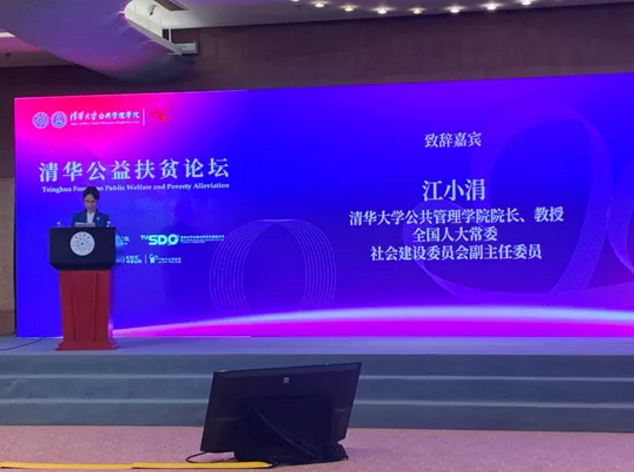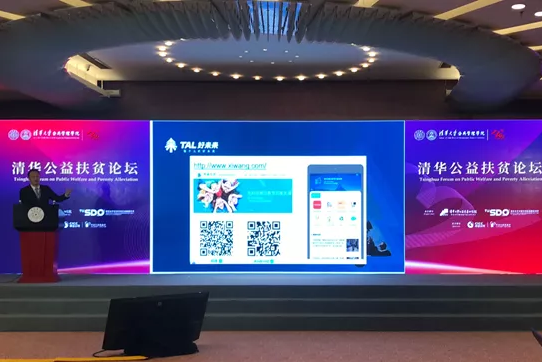




On November 7, the Tsinghua Public Welfare Poverty Alleviation Forum, hosted by the School of Public Administration and Tsinghua University's Institute for Philanthropy and Public Welfare, and the Institute for Global Sustainable Development, was held in Beijing.
This year marks the final year of the decisive battle against poverty and the closing year of the "Thirteenth Five-Year Plan." In the face of new international situations and challenges, how to better mobilize all of society's resources and consolidate the achievements in poverty alleviation, achieving the normalization and sustainability of poverty alleviation, became the focus of the forum.

Jiang Xiaojuan, Dean and Professor of the School of Public Policy and Management at Tsinghua University, member of the Standing Committee of the National People's Congress, and Deputy Director of the Social Construction Committee, delivered a speech
During the speech, Jiang Xiaojuan, Dean and Professor of the School of Public Policy and Management at Tsinghua University, and member of the Standing Committee of the National People's Congress, expressed that the formation of poverty stems from various factors such as politics, economy, culture, and ecology. It requires a comprehensive solution and cooperation by all parties to form a community of shared future, in order to strive for a better world and a better life.
The Special Representative for European Affairs of the Chinese Government and Co-Director of the Institute for Sustainable Development Goal at Tsinghua University, Wu Hongbo, the Vice Chairman of the China Development Research Foundation, Lu Mai, and Dr. Wan Yiting, Executive President of TAL, were invited to participate in the forum and deliver keynote speeches.

Dr. Wan Yiting, Executive President of TAL, shared practical cases of education poverty alleviation
As a representative of private technology education enterprises, Dr. Wan Yiting, Executive President of TAL, expressed that "Poverty alleviation must begin with the fostering of aspiration and the imparting of knowledge. Cultivating both will and wisdom is where the education sector excels—and a key strength of TAL."
From providing financial resources in the 1.0 stage, sending teachers in the 2.0 stage, to delivering technology in the 3.0 stage, TAL has been actively exploring and persistently reforming the supply side of education poverty alleviation, insisting on technological advancement with an aim to make education poverty alleviation projects "useful, well-functionning, long-lasting, and precise," and has gained some replicable experience.
In her speech, Dr. Wan Yiting shared the practical experience of education poverty alleviation combined with love and technology at TAL.
In the remote Daliangshan area, nearly 80,000 Yi students in 252 teaching sites are learning Mandarin through the ""Learning Chinese from AI Teacher"—a system developed by TAL. Many children are now able to understand basic daily phrases, and their learning efficiency has increased two to three times compared to before.
In Jimunai, Xinjiang, teachers from TAL are working with local teachers to teach students through the Internet thanks to the "Dual-teacher Mode.
Meanwhile, TAL is also cultivating local teachers through the "Dual-teacher Mode" gradually transforming education poverty alleviation from simply "providing aid" to "fostering self-sustaining capabilities."
In Bijie, Guizhou, TAL's "Starting Point Program" has provided educational research resources, training, and an information platform for more than 300 kindergarten teachers in 51 kindergartens, influencing more children by improving the level of rural teachers.
The "Hope Online" platform initiated by TAL Charitable Foundation integrates high-quality education and technology resources from TAL's subsidiaries to assist in improving education in impoverished areas.
Since its launch in 2017, "Hope Online" has covered 40 counties in 18 provinces such as Shaanxi, Hebei, Guizhou, Xinjiang, Yunnan, and Sichuan, benefiting over 100,000 impoverished teachers and students.
This year is the decisive year for the battle against poverty, and the sudden epidemic has brought new challenges to winning the battle against poverty as planned. During the epidemic, companies in the education and training industry such as TAL actively played to their strengths in resources and technology, demonstrating the industry's value and social responsibility.
"The more challenges facing, the more important love and technology are," Wan Yiting said. After the outbreak of the epidemic, TAL established a special fund of 100 million yuan to fight the epidemic, of which 20 million was donated to the Wuhan Charity Federation and 80 million was used to support the "keep learning despite class suspension" campaign. They provided free live broadcast classes for primary and secondary school students nationwide through its brand Xueersi Online School, while also providing free technical support to public schools and other training institutions.
According to statistics, during the epidemic, more than 60 million students watched live classes on Xueersi Online School every day, including many children in remote areas.
In addition, TAL's smart education has provided live teaching systems and free live broadcast classes for more than 300 schools in 49 cities and counties, benefiting over 5 million teachers and students.
2021 is the beginning of the "Fourteenth Five-Year Plan," during which the central government has made it clear that next year, the comprehensive integration of poverty alleviation into rural revitalization will become a new proposition for future poverty alleviation work. The role of education in this will also become more prominent.
In Wan Yiting's opinion, education poverty alleviation requires the joint efforts of thousands of people. TAL hopes to join hands with governments, universities, enterprises, and non-profit organizations to provide better and fairer education for more children.
At the same time, TAL will use the accumulated experience in teaching and research and the cutting-edge education technology in the past 17 years to achieve three "large-scale" objectives of education poverty alleviation projects with its partners: large-scale high quality, large-scale warmth, and large-scale customization, making education an important part of rural revitalization and rural construction.